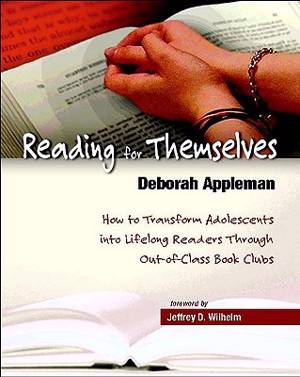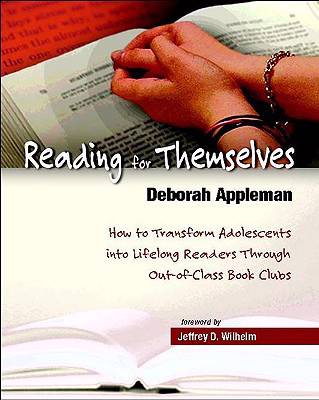
- Retrait gratuit dans votre magasin Club
- 7.000.000 titres dans notre catalogue
- Payer en toute sécurité
- Toujours un magasin près de chez vous
- Retrait gratuit dans votre magasin Club
- 7.000.0000 titres dans notre catalogue
- Payer en toute sécurité
- Toujours un magasin près de chez vous
Reading for Themselves
How to Transform Adolescents Into Lifelong Readers Through Out-Of-Class Book Clu Bs
Jeffrey D Wilhelm, Deborah ApplemanDescription
- Deborah Appleman is a dynamo.... [A] positive energy of possibility is reflected in all her work, including the book you hold in your hands now.
Jeffrey D. Wilhelm, coauthor of Reading Dont Fix No Chevys
Just as adolescents arent only students, literate behaviors arent only for school. Engaging students in reading for pleasure through extramural book clubs can promote both lifelong literacy habits and improved in-school performance. Reading for Themselves shows you how to create and make the most of out-of-class book clubs.
Based on five years of research in urban and suburban schools, Reading for Themselves provides a theoretical rationale for starting out-of-school book clubs and practical strategies for nurturing them. Deborah Appleman shows you how book clubs simultaneously give teenagers a positive reading experience and give you insights about their reading and useful information for instruction. With numerous examples drawn from student book clubs, Appleman offers smart suggestions for:
- helping reluctant readers become enthusiastic, lifelong readers
- giving students a structure within which to discover an extracurricular reading life as they transition toward adulthood
- using alternative instructional practices to encourage students as they read
- understanding how gender affects literacy practices and how it can inform your teaching practices
- building bridges between kids by using contemporary literature as a starting point for discussions of issues of race, class, and culture
Reading for Themselves gives you, the teacher, all the tools you need to play the role of facilitatorincluding book lists and facilitators tipsin a book club motivated by student choice and interest. As your book club reads on, Appleman is there with ways to help readers negotiate the passage between adolescent and adult literacy, the border between school-sponsored and self-sponsored reading, and the differences in identity between groups from diverse geographical, social, and cultural backgrounds.
Pleasure is the most compelling purpose for reading, and theres no better way to introduce students to the joys of lifelong reading than with out-of-school book clubs. Read Deborah Appleman today and get your students Reading for Themselves.
Spécifications
Parties prenantes
- Auteur(s) :
- Editeur:
Contenu
- Nombre de pages :
- 128
- Langue:
- Anglais
Caractéristiques
- EAN:
- 9780325008271
- Date de parution :
- 01-08-06
- Format:
- Livre broché
- Format numérique:
- Trade paperback (VS)
- Dimensions :
- 187 mm x 237 mm
- Poids :
- 235 g

Les avis
Nous publions uniquement les avis qui respectent les conditions requises. Consultez nos conditions pour les avis.






